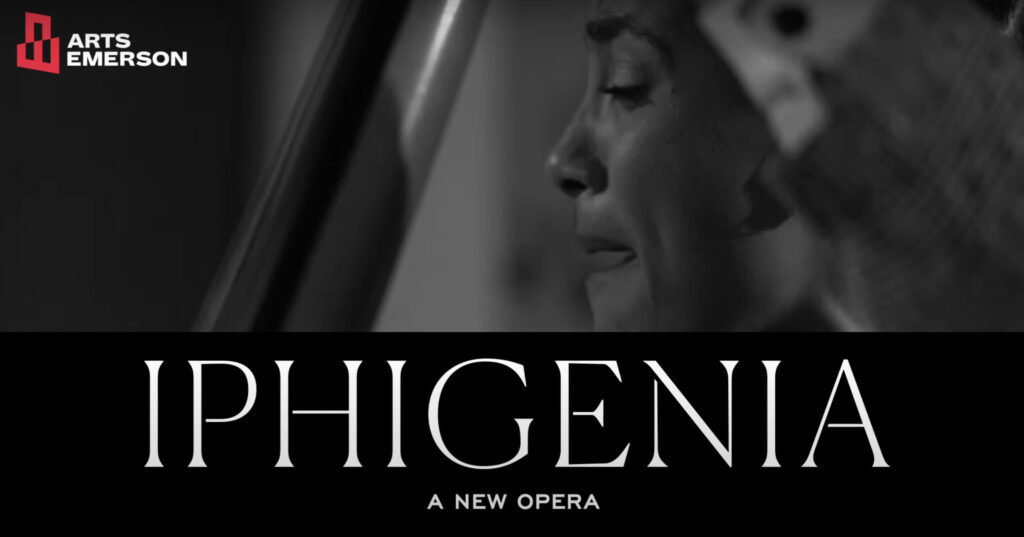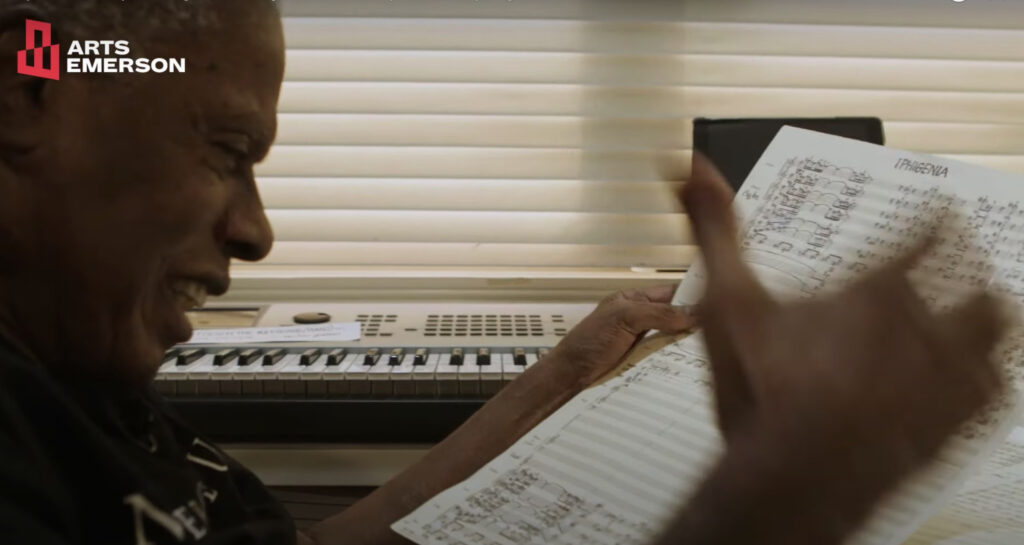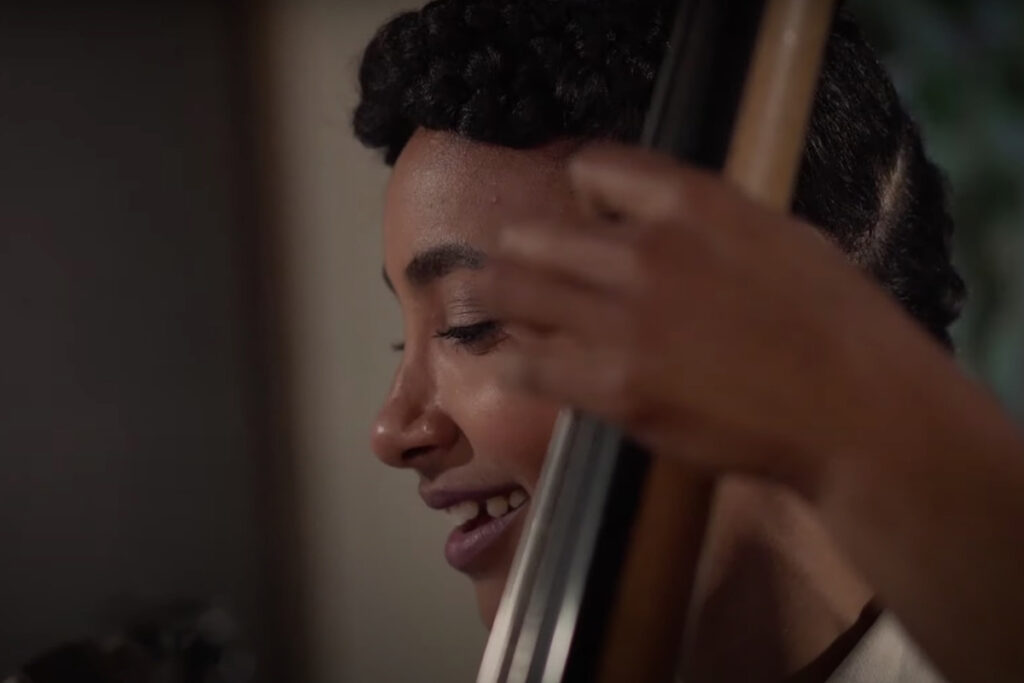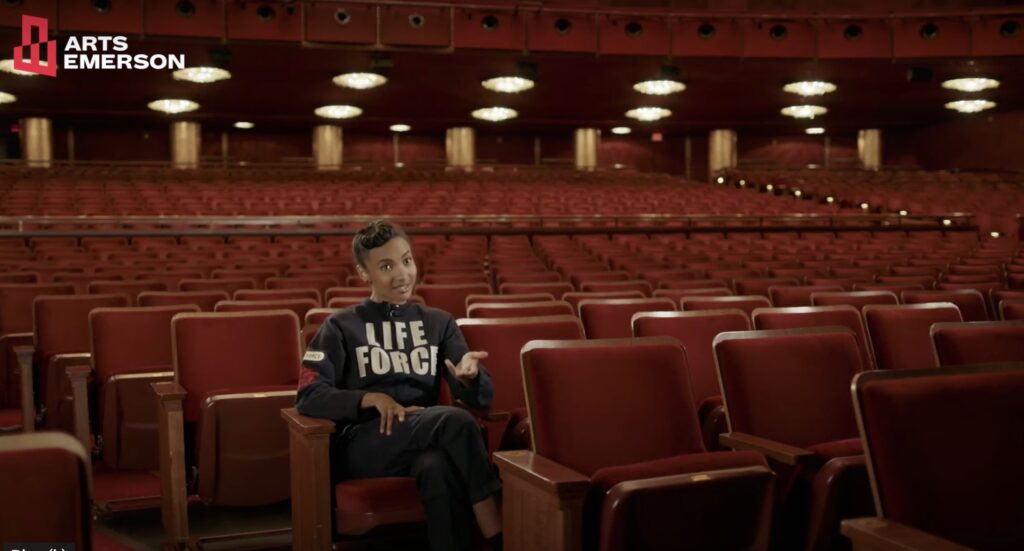Mythmaking and Cycle-Breaking: Social Justice Themes in …(Iphigenia)

For years now, first at New York University, now at Emerson, whenever Dana Edell teaches a class on theatre and activism, she starts the semester with a reading of Euripides’ Iphigenia in Aulis.
“That’s one of the plays [from antiquity] I feel is deeply relevant today,” she said.
This semester was no exception, so Edell, a newly arrived assistant professor in Performing Arts and a scholar of Ancient Greek drama, dropped it at the top of the syllabus for her Theatre and Social Justice graduate-level course.
Then she learned that ArtsEmerson would be presenting the world premiere of …(Iphigenia), an operatic retelling of the myth years in the making, with music by jazz legend Wayne Shorter, libretto by Grammy-winning musician esperanza spalding, and a set designed by famed architect Frank Gehry. It would be a major theatrical event, a showcase of creative genius, an interrogation of the nature of power – and for Edell, an irresistible opportunity.

She connected with David Howse, vice president of Office of the Arts and ArtsEmerson executive director, and creative producers Akiba Abaka and Kevin Becerra about ways her class could be involved with the production.
“I wanted there to be some sort of community engagement project during the semester,” Edell said.
The ArtsEmerson team did have a project for Edell’s class: Implement a social justice workshop the class created based on the themes of Iphigenia within ArtsEmerson’s Play Reading Book Club. The hour-long workshops use theatre activities to dive deeper into the play, personal storytelling to help participants connect their own experiences to the themes of the myth, and get them excited to see the show. Edell also is moderating a talk back with spalding and local scholars and thought leaders on Monday, November 15.
The Myth
Iphigenia in Aulis, one of Euripides’ last tragedies and produced posthumously, is brimming with questions that reverberate in our contemporary world.
In a nutshell: King Agamemnon, commander of the Greeks in the Trojan War, decides to sacrifice his daughter, Iphigenia, to the goddess Artemis so that his fleet can sail to battle with Troy. The hero Achilles, whom Agamemnon has used in a marriage plot ruse to get his wife to bring Iphigenia to Aulis to be slaughtered, figures out what is happening and vows to defend Iphigenia – not a popular position with his fellow Greeks, who threaten to stone Achilles. Seeing that the situation is untenable, and grasping power from vulnerability, Iphigenia asks to be sacrificed so that she might save Greece.
Edell said in her work around girls’ activism, she talks about the character, Iphigenia, a lot.
“She’s a total victim and a total hero at the same time. She changes her mind through the course of the play and says, ‘I want to die, please kill me so I can save my country.’ It says a lot about what it means to be a girl – martyr or victim?” Edell said. “Even looking at it through the lens of reproductive rights … those themes are also deeply relevant and connected, how women’s bodies have always been mined for politics and exploited.”
Alongside themes of women’s power and exploitation is a strong anti-war message. Euripides, whose son was fighting in the Peloponnesian War, knew his audiences would be filled with citizens who would be able to vote on whether or not to end the conflict, Edell said.
“Euripides was using the most pure, innocent character, saying, ‘This is what we’re doing, we’re sacrificing them for everyone else.’ He wrote this play to show the deep, deep horrors of war. It’s about a father choosing to sacrifice his daughter – [Euripides] knew in the audience [would be] all the fathers who were sacrificing children in the war,” she said.

The Show
Not only is …(Iphigenia), directed by Lileana Blain-Cruz, having its world premiere at the Cutler Majestic Theatre November 12-13, it also will be the first in-person show ArtsEmerson will have staged since early 2020, when the pandemic shuttered theaters and dimmed house lights around the world.
And when theatergoers from around Greater Boston gather in the Cutler Majestic for the first time in 20 months (adhering to ArtsEmerson’s COVID protocols), they will bring a magic of their own.
Read: Preview of …(Iphigenia) in New York Times
Producers and staff at ArtsEmerson, most of whom are Generation X or Millennials, knew esperanza spalding, the 37-year-old jazz bassist, vocalist, and composer, would be a big draw, ArtsEmerson Creative Producer Akiba Abaka said.
But it turns out that Wayne Shorter, the 88-year-old saxophonist and band leader who came to prominence in the 1950s, is creating a lot of buzz of his own, Abaka said.
“We’re really hearing a lot of excitement around the idea that Wayne Shorter has written an opera. People are like, ‘This is going to be phenomenal,’” she said.
“That’s what makes this such a dynamic production, because it’s engaging so many generations,” Abaka added. “Younger generations are coming to see esperanza spalding, and older generations are coming to see Wayne Shorter, and they’re going to converge. That’s going to make for an incredible night.”

Engaging the Community
ArtsEmerson typically hires one or two graduate students per season to help with audience engagement, including facilitating the Play Reading Book Clubs (PRBC), although this will mark the first time an entire class is involved with the PRBCs, Abaka said.
Each season, ArtsEmerson will host PRBCs centered around selected shows. Held at up to four locations in communities throughout Boston, participants encounter the scripts together for the first time at a table read, after which they engage with the text through discussions about how the play connects to their own experiences. Some locations will present staged readings of excerpts of the play for others in their community. Participants will then attend a performance of the show, and often, a private reception with artists from the production.
“In that process, what Dana offered through her class was to look at the social justice relevance of …(Iphigenia) and to offer a workshop on social justice angles of the play,” Abaka said.
Lemar Archer, a student in Theatre Education graduate program and one of Edell’s students, will be working with the …(Iphigenia) PRBC based at ArtsEmerson. He called it “remarkable” that a tale written in 405 BCE could still be so socially and politically relevant to us today.
“In my time being in the class, I have learned that stories are a major part of realizing truths and unearthing issues that need to be addressed, so I’m just really anxious to hear the stories and the discussions coming from this ancient play, and just to talk more about the themes,” he said.
Megan Vaughn, another Theatre Education graduate student who is working with the PRBC hosted virtually with Boston While Black, said in many ways, myths from antiquity are especially useful in drawing out experiences and conversations about potentially difficult topics.
“I feel like it’s a really interesting way to set up … scenarios where [students] can relate present-day things they’re experiencing through a different lens without using characters that hit super close to home. [But] they can still draw parallels they see, different power structures they see, through that lens,” Vaughn said.

While Edell and her students haven’t yet seen the opera (it’s rehearsing November 11 and 12 at MassMOCA in North Adams, Mass.) they did get a visit over Zoom from the show’s star and co-creator, esperanza spalding.
Spalding, who told the class she deconstructed Euripides’ telling of the myth in her libretto, spoke about how women throughout the ages have connected with Iphigenia – relating her ultimate sacrifice to sacrifices of their own.
“She mentioned something that really struck me, about how she longed to see a cycle interrupted,” Vaughn said. “There’s so many things today in our world and society that I would also long to see the cycle interrupted, so that was really beautiful.”
For more information, or to purchase tickets for …(Iphigenia), visit ArtsEmerson. Emerson students, faculty, and staff get discounted ArtsEmerson tickets and free rush tickets.
Categories